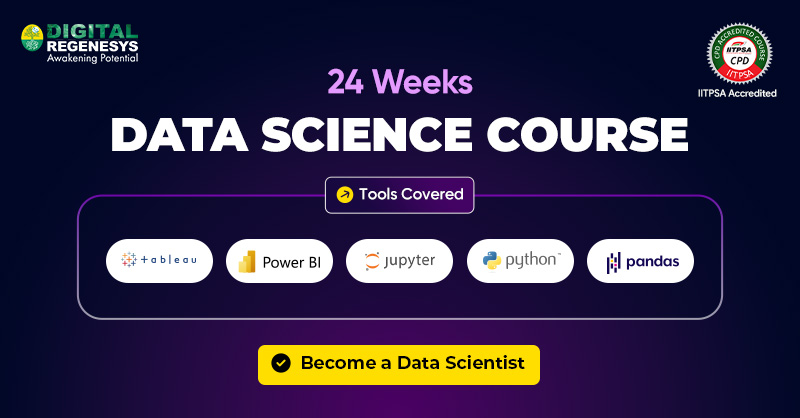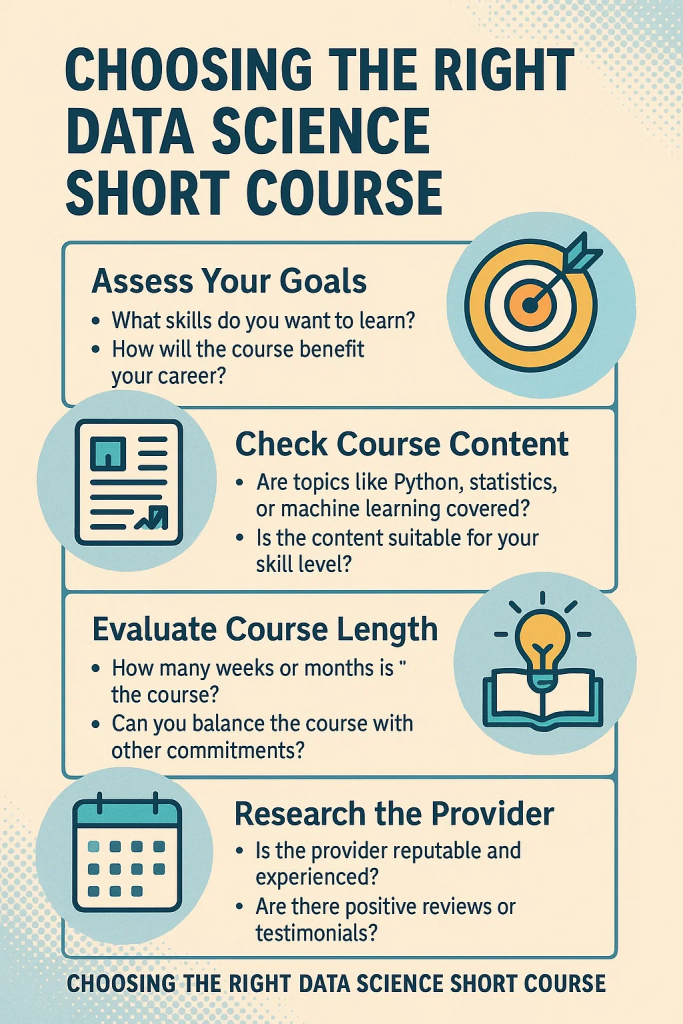Choosing the Right Data Science Short Course

The demand for data science skills continues to rise as organisations across industries adopt data-driven decision-making. From healthcare to finance, retail to technology, the ability to analyse, interpret, and apply data insights has become a game-changer.
This demand has led to a surge in short courses, each promising to prepare learners for lucrative careers in data science. However, with numerous options available, selecting the right data science short course can be a daunting task.
Making the correct choice is crucial because the right course builds confidence, enhances employability, and sets learners on a pathway to career success. A mismatched course, on the other hand, may result in wasted time, effort, and resources.
In this article, we explore how to select the right data science short course based on career goals, curriculum quality, flexibility, and certifications. By focusing on the right factors, learners can make informed decisions that ensure long-term value and tangible career outcomes.
Identify Your Career Goals
Before enrolling in any course, it is important to clarify your career goals. Data science is a broad field encompassing a range of disciplines, including programming, analytics, machine learning, and business intelligence. Some learners may be seeking their first job, while others may aim to switch careers or upskill in their current roles.
Choosing a course without understanding your goals may lead to gaps in knowledge or irrelevant content. Start by asking yourself where you want to be in one to three years, and then select a course that aligns with your vision.
Learners often pursue data science short courses to:
- Prepare for entry-level roles in analytics
- Switch careers into data science or AI
- Gain skills relevant to their current job
- Strengthen analytical and problem-solving skills
- Advance into leadership or specialised roles
Know more about Is Data Science Different From Machine Learning.

Evaluate the Course Curriculum
The strength of a data science short course lies in its curriculum. A course that covers outdated or irrelevant content will not prepare learners for today’s job market. Instead, focus on whether the modules cover the essential technical and analytical skills needed in industry.
Look for topics like Python programming, SQL databases, machine learning, and data visualisation. Equally important is the inclusion of practical, project-based learning, which bridges the gap between theory and application.
A strong curriculum ensures that you not only learn, but also learn what truly matters in the workplace.
A good curriculum typically includes:
- Python programming and data analysis
- SQL for database management
- Machine learning fundamentals
- Business intelligence and visualisation tools
- End-to-end project work

Look for Practical, Hands-On Learning
Data science is not a field where theory alone is enough. Employers expect professionals to apply concepts in real-world contexts, solving actual problems with data. That’s why the best short courses emphasise hands-on practice. Working on projects with real datasets allows learners to develop job-ready skills, test different tools, and build confidence.
Portfolios created during these projects can be showcased to employers, demonstrating tangible skills and abilities. When choosing a course, prioritise those with opportunities for practical application, as this will directly translate to stronger career outcomes.
Practical elements of a strong course include:
- Case studies using real business data
- Capstone projects simulating industry scenarios
- Assignments aligned with workplace challenges
- Use of widely adopted tools like Python and Tableau
- Problem-solving exercises to reinforce learning
Flexibility and Learning Modes
For many professionals, balancing learning with work or personal responsibilities can be challenging. This is where flexible course structures become invaluable. Self-paced modules, weekend-friendly schedules, and online delivery make it easier to learn without disrupting current commitments.
Flexibility also accommodates different learning styles, allowing individuals to revisit content or progress at their own pace. Courses that are modular and accessible online are particularly valuable, as they break down complex concepts into manageable steps while ensuring global accessibility.
Flexibility ensures that career advancement fits seamlessly into a busy work and personal life.
Flexible learning options often include:
- Online, self-paced study modules
- Weekend or part-time scheduling
- Recorded lessons for review
- Modular content progression
- Accessibility from anywhere in the world
Learn more about the Programming Language Used in Data Science.
Certification and Recognition
A course certificate is more than just a piece of paper; it is proof of your learning and a signal of credibility to employers. Recognised certifications demonstrate that you have completed structured training and acquired practical skills. They add value to CVs, LinkedIn profiles, and job applications, often making the difference between being shortlisted or overlooked.
Beyond employability, a certificate shows commitment to continuous learning, which employers value highly. Always ensure that the course you choose offers recognised certification that aligns with industry expectations.
Along with certification, here are other key factors to evaluate when choosing a course:
|
Factor |
Why It Matters |
What to Look For |
|
Career Goals |
Ensures alignment with your professional aspirations |
Entry-level, career switch, or upskilling pathways |
|
Curriculum |
Provides industry-relevant and comprehensive learning |
Python, SQL, Machine Learning, Visualisation, BI, and project-based learning |
|
Practical Learning |
Builds real-world, job-ready skills |
Case studies, capstone projects, hands-on tools |
|
Flexibility |
Makes learning manageable alongside work or study commitments |
Self-paced modules, weekend options, and recorded lessons |
|
Certification |
Adds credibility and validation of skills |
Recognised, employer-valued certification |
|
Career Outcomes |
Increases employability and growth potential |
Job readiness, promotions, and role transitions |
Why Choose Digital Regenesys?
When evaluating your options, the Digital Regenesys Data Science Certificate Course emerges as a reliable choice. It integrates all the key elements learners should look for: an industry-aligned curriculum, practical projects, flexibility, and recognised certification. The course ensures that learners master both technical and analytical skills while applying them to real datasets.
Its modular structure makes it easy for working professionals to balance learning with other commitments. By the end, graduates are not only certified but also job-ready, with a portfolio of projects that showcase their expertise.
Key highlights of the Digital Regenesys course include:
- Comprehensive, career-focused curriculum
- Hands-on, project-based learning
- Flexible, self-paced modules
- Recognised and employer-valued certification
- Strong outcomes for career growth
Explore details on Why Should I Study Data Science.
Conclusion
Choosing the right data science short course can be the turning point in your career. By aligning your goals with a course that offers a relevant curriculum, hands-on learning, flexibility, and recognised certification, you ensure that your investment of time and effort pays off.
A well-chosen programme not only teaches technical concepts but also empowers you to apply them confidently in the workplace, opening doors to rewarding opportunities in the growing field of data science.
The Digital Regenesys Data Science Certificate Course embodies all these qualities, offering learners a structured, flexible, and practical pathway to success. With industry-relevant training and real-world projects, it equips professionals with the tools needed to thrive in today’s data-driven economy.
Ready to take the next step in your career? Visit Digital Regenesys to enrol and start your journey today.
Last Updated: 5 November 2025
